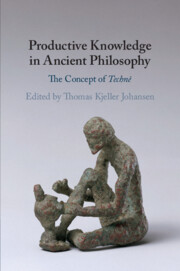Book contents
- Productive Knowledge in Ancient Philosophy
- Productive Knowledge in Ancient Philosophy
- Copyright page
- Contents
- Contributors
- Acknowledgements
- List of Abbreviations
- Introduction
- Chapter 1 Protagoras on Political Technê
- Chapter 2 Dynamic Modalities and Teleological Agency
- Chapter 3 Technê As a Model for Virtue in Plato
- Chapter 4 Crafting the Cosmos
- Chapter 5 Aristotle on Productive Understanding and Completeness
- Chapter 6 Technê and Empeiria
- Chapter 7 The Stoics on Technê and the Technai
- Chapter 8 The Epicureans on Technê and the Technai
- Chapter 9 The Sceptic’s Art
- Chapter 10 Plotinus on the Arts
- Chapter 11 Productive Knowledge in Proclus
- Bibliography
- General Index
- Index Locorum
Chapter 8 - The Epicureans on Technê and the Technai
Published online by Cambridge University Press: 14 January 2021
- Productive Knowledge in Ancient Philosophy
- Productive Knowledge in Ancient Philosophy
- Copyright page
- Contents
- Contributors
- Acknowledgements
- List of Abbreviations
- Introduction
- Chapter 1 Protagoras on Political Technê
- Chapter 2 Dynamic Modalities and Teleological Agency
- Chapter 3 Technê As a Model for Virtue in Plato
- Chapter 4 Crafting the Cosmos
- Chapter 5 Aristotle on Productive Understanding and Completeness
- Chapter 6 Technê and Empeiria
- Chapter 7 The Stoics on Technê and the Technai
- Chapter 8 The Epicureans on Technê and the Technai
- Chapter 9 The Sceptic’s Art
- Chapter 10 Plotinus on the Arts
- Chapter 11 Productive Knowledge in Proclus
- Bibliography
- General Index
- Index Locorum
Summary
These two chapters form a conceptual unity. Their aim is, first, to present and, then, to compare the concepts of technê (art, craft, discipline, expertise) used, respectively, by the Stoics and the Epicureans in different philosophical domains – notably, in cosmology, epistemology and ethics. The main issues to be discussed include the definition of a technê; the criteria determining a technê, the importance of rules and method, the role of experience and practice, the structure of every technê in so far as it is directed towards a goal, the necessary and sufficient conditions for the transmissibility of different sorts of technai and the common assumption that the technai are beneficial for life. Moreover, Tsouna argues that the notions of technê occurring in Stoic and Epicurean texts differ, and she explains how they differ. She suggests that one reason for that fact is that these two schools react in different ways to Plato’s rationalism about technê. On the one hand, the Stoics’ creative appropriation of Plato leads them to formulate a principally rationalistic notion of technê, which is manifest, for example, in their cosmological creationism (cf. the notion of technikon pur), the epistemological distinction between first-order technai and the epistêmê of the wise man, and their ethical conception of the art of living. On the other hand, the Epicureans react to the Platonic heritage in a more negative way and appear to modify their views about technê accordingly. Vis-à-vis the Stoics, they exhibit greater flexibility regarding the criteria of ‘technicity’ and attribute more value to common experience than many Stoics do. Their physical theory precludes any idea of divine craftsmanship. As for Epicurean epistemology and ethics, both involve uses of technê consistent with Epicurean empiricism and the ethical view that pleasure or the absence of pain is the supreme good.
- Type
- Chapter
- Information
- Productive Knowledge in Ancient PhilosophyThe Concept of <I>Technê</I>, pp. 191 - 225Publisher: Cambridge University PressPrint publication year: 2021

